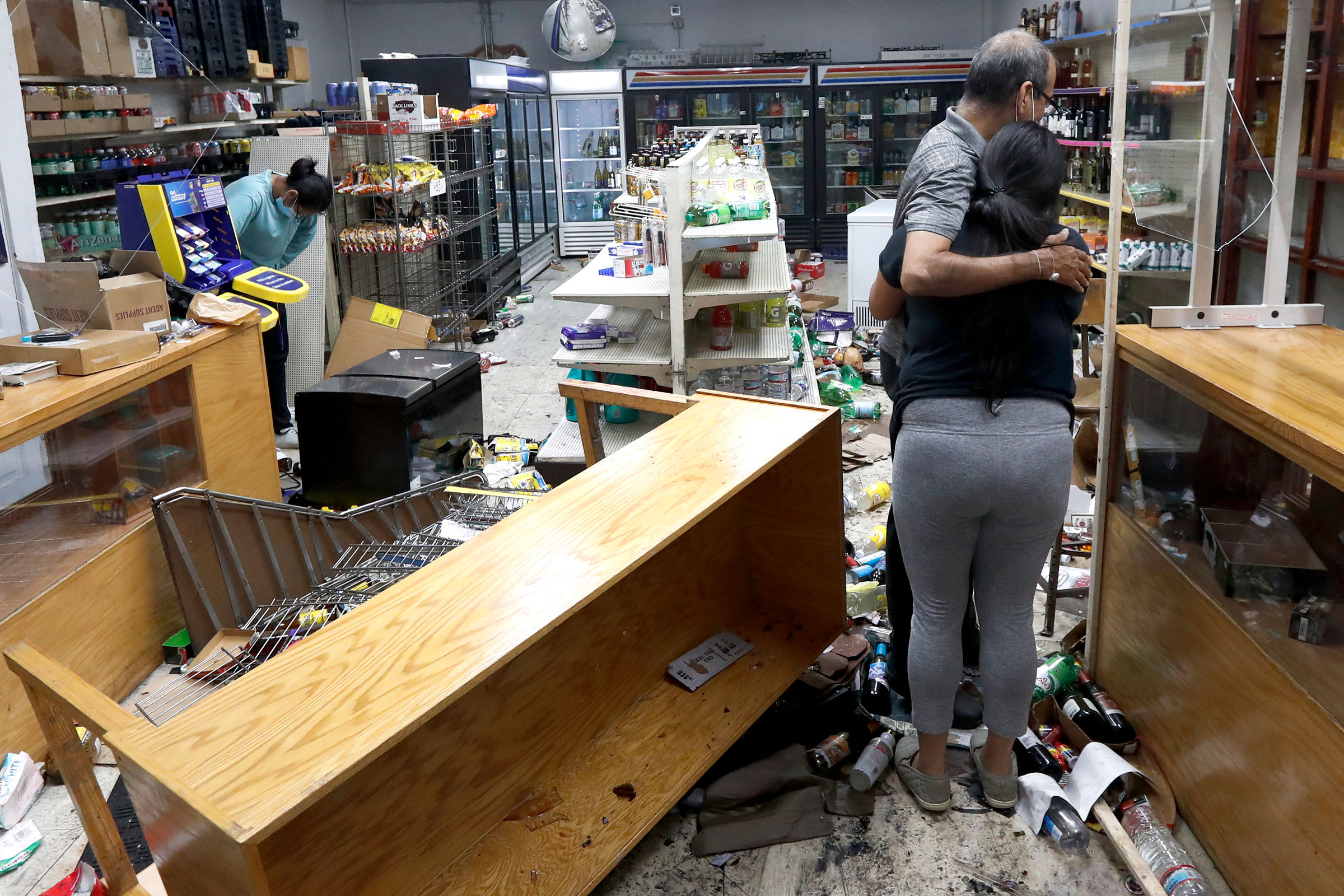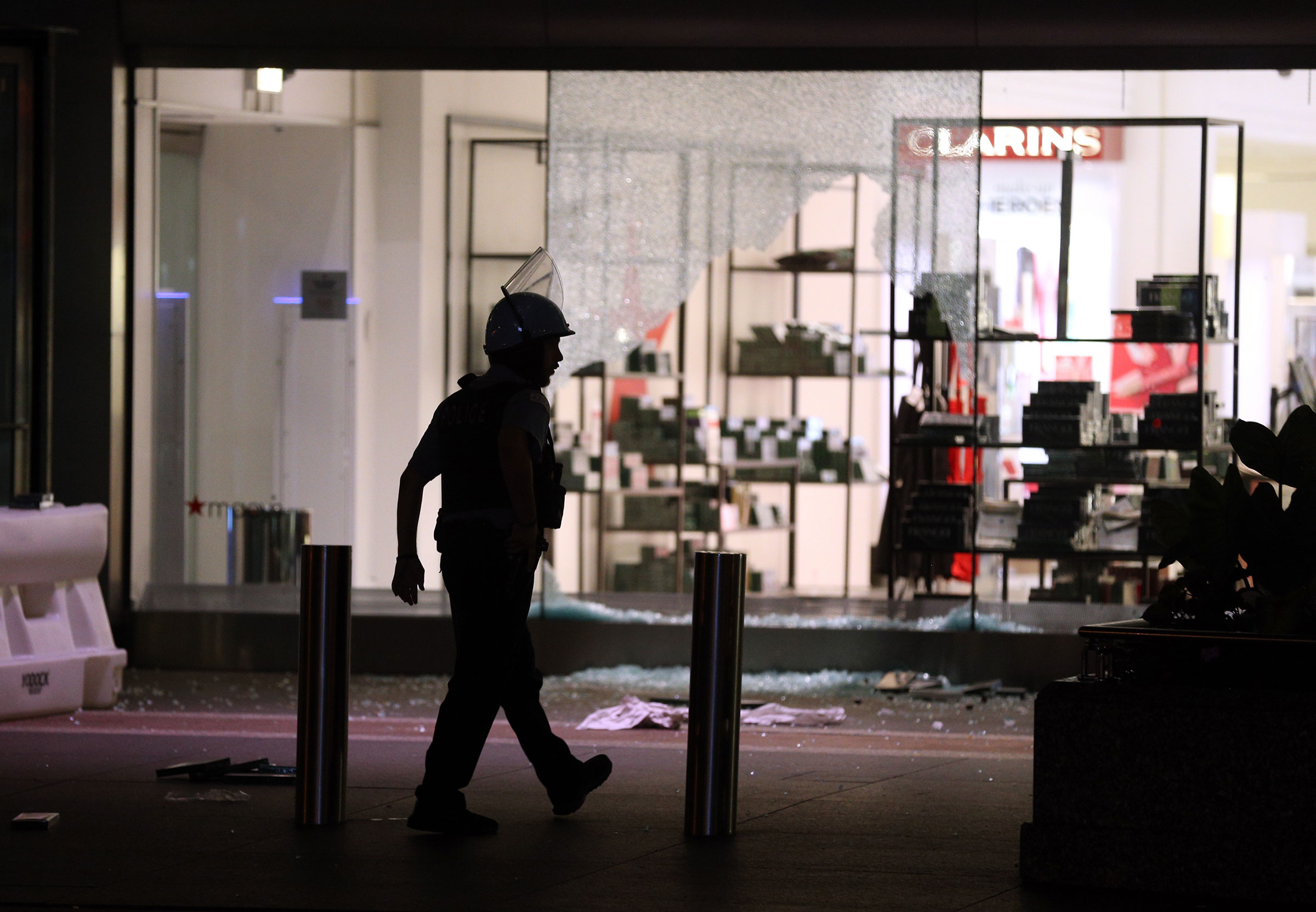
As businesses across downtown Chicago try to retool and rebuild after widespread looting and vandalism brought damage to the area on Sunday night, and amid continued demonstrations supporting the Black Lives Matter movement, activists and community members in the city worry that residents’ already contentious relationship with the city’s police department is being further strained.
The looting and unrest “was just painful to see,” Pastor Donovan Price, a community activist in Chicago, tells TIME. Of the ways in which such incidents often color perceptions of racial justice protests and the city’s Black community’s disenfranchisement, “it will definitely push back any progress we might have made in this city,” he says.
Other residents are concerned about how such behaviors will impact policing practices and a federal law enforcement presence in the city, following a back-and-forth between President Trump and Chicago Mayor Lori Lightfoot. (“We are coming for you,” Mayor Lightfoot said in a speech to the people who engaged in criminal behavior on Sunday night.) While many say they haven’t been aware of federal officers’ presence thus far, some worry that this could exacerbate tensions to the point that their involvement is proactive.
“I’ve lived here for 20 years, and it’s getting scary, because you can’t walk out now,” Alan Freeman, a downtown resident told the Associated Press. “You don’t know if they’re going to start with the people walking on the streets, instead of the stores.”
Largely in response to an officer-involved shooting in Chicago’s Englewood neighborhood, thousands of people took to the streets of the city in chaotic scenes on Sunday night. Some broke into businesses, stole items and violently engaged with police; according to witnesses, cars were dropping people off so they could break into stores, grab items and run away before police could apprehend them.
Thirteen people were injured and two were shot. Over 100 people were arrested; with charges for many still pending, the Chicago Community Bond Fund has tweeted that they are prepared to make bond payments in response to the arrests.
Monday night saw a series of more-structured protests, led by members of Black Lives Matter Chicago, in support of those who were arrested the night before. “I don’t care if someone decides to loot a Gucci or a Macy’s or a Nike store, because that makes sure that person eats,” Ariel Atkins, a BLM organizer, said on Monday. “That makes sure that person has clothes.”

On Sunday afternoon, police officers shot 20-year-old Latrell Allen — a Black man who they were chasing and who had allegedly fired at them first, according to authorities. Allen was taken to the hospital in police custody and is recovering.
Some neighborhood residents, and members of Allen’s family, have painted a different story. A man identified as Allen’s brother told the Chicago Sun-Times that he and his brother were among a group of people walking from a local park when, “someone made a comment to officers in a police vehicle that prompted a pursuit.”
While the man acknowledged he did not see the shooting, he said he did not trust in the police department’s narrative. “My brother ain’t fired at no police,” he told the Sun-Times.
It was later confirmed that the officers involved in the shooting did not have body cameras.
Reports and misinformation regarding the incident later circulated via social media — including that a minor had been shot, which was not the case — and spurred what police later described as a “very hostile” confrontation between officers and neighborhood residents. Two people were arrested.
On Monday, authorities said that they believed that misinformation had also fueled the larger response in downtown Chicago, arguing that the shooting had served merely an opportunity that people took advantage of.
“This was not an organized protest. This was an act of pure criminality,” Chicago Police Superintendent David Brown said at a Monday press conference. “Criminals took to the streets with the confidence that there would be no consequences for their actions.”
“I don’t agree with the looting because that’s just an excuse to get what they want,” Joyce Brown, Allen’s grandmother, told the Chicago Tribune. “That was wrong about the looting, but the same way they feel about looting, I feel about our grandson.”
In a statement released on Monday, Black Lives Matter Chicago said that the unrest will continue until Mayor Lightfoot takes action in support of the city’s residents
“The mayor clearly has not learned anything since May [when protests begun up again in Chicago], and she would be wise to understand that the people will keep rising up until the CPD is abolished and our Black communities are fully invested in,” the statement says. “We are reminding the mayor that she has not provided Black communities any alternative for demanding justice.”
“It should be a wake-up call for [the city government],” Mark Carter, a local community activist says, arguing that the response was warranted as a call-to-action and response to continued disenfranchisement. “They need to include [Black] people in the development of this city. You think people are supposed to just suffer peacefully? It’s not going to happen like that.”
More Must-Reads from TIME
- Cybersecurity Experts Are Sounding the Alarm on DOGE
- Meet the 2025 Women of the Year
- The Harsh Truth About Disability Inclusion
- Why Do More Young Adults Have Cancer?
- Colman Domingo Leads With Radical Love
- How to Get Better at Doing Things Alone
- Michelle Zauner Stares Down the Darkness
Write to Josiah Bates at josiah.bates@time.com